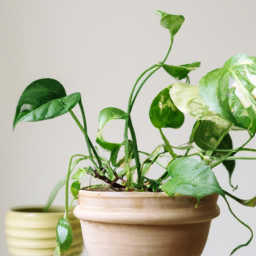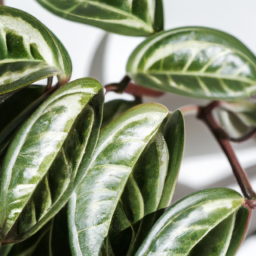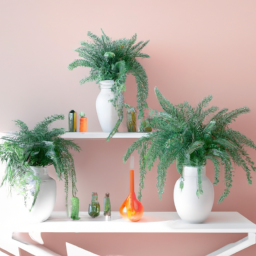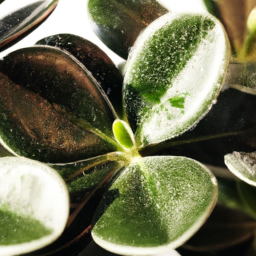
Are indoor plants good for you? This is a question that many people ask themselves when considering adding some greenery to their indoor spaces. Indoor plants have been proven to have numerous benefits, both for your physical health and mental well-being. From improving air quality to reducing stress and boosting mood, the presence of indoor plants can have a positive impact on your overall quality of life. In this blog post, we will explore the many reasons why indoor plants are good for you and why you should consider incorporating them into your home or office space.
Benefits of Having Indoor Plants
Improved Air Quality
Introduction
Indoor plants are not just decorative items; they also play a crucial role in improving air quality. Plants absorb carbon dioxide and release oxygen through the process of photosynthesis. This helps to purify the air and create a healthier environment indoors.
Health Benefits
In addition to improving air quality, indoor plants have been shown to have numerous health benefits. Studies have found that having plants indoors can reduce stress, boost mood, and even improve concentration and productivity. The presence of plants in indoor spaces has also been linked to lower levels of anxiety and depression.
Furthermore, indoor plants can help to reduce the symptoms of conditions such as asthma and allergies. Certain plants have air-purifying properties that can remove toxins and allergens from the air, making it easier for people with respiratory issues to breathe comfortably.
Care and Maintenance
While indoor plants offer a range of benefits, it is important to remember that they require care and maintenance to thrive. Different plants have different needs in terms of light, water, and temperature, so it is important to research the specific requirements of each plant you bring into your home.
Regular watering, proper drainage, and occasional fertilization are essential for keeping indoor plants healthy. It is also important to monitor for pests and diseases, as these can quickly spread and harm your plants if left unchecked.
In conclusion, indoor plants are not only aesthetically pleasing but also offer a range of health benefits. By incorporating plants into your indoor spaces and providing them with the care they need, you can create a healthier and more enjoyable environment for yourself and your loved ones.

Best Indoor Plants for Air Quality
Introduction
When it comes to improving the air quality in your home, indoor plants can be a great natural solution. Not only do they add a touch of greenery to your space, but they also have the ability to purify the air by removing toxins and releasing oxygen. In this article, we will explore some of the best indoor plants for air quality and how they can benefit your health and well-being.
Benefits of Indoor Plants for Air Quality
Indoor plants are not only aesthetically pleasing, but they also have a number of health benefits. One of the main benefits of indoor plants is their ability to purify the air by removing harmful toxins such as formaldehyde, benzene, and trichloroethylene. These toxins are commonly found in household items such as paint, furniture, and cleaning products, and can have a negative impact on your health.
In addition to purifying the air, indoor plants also release oxygen during the photosynthesis process, which can help improve the air quality in your home. This can lead to better respiratory health, increased focus and productivity, and a general sense of well-being. Studies have also shown that indoor plants can help reduce stress and anxiety, making them a great addition to any indoor space.
Best Indoor Plants for Air Quality
1. Spider Plant: The spider plant is known for its ability to remove toxins such as formaldehyde and xylene from the air. It is easy to care for and thrives in indirect sunlight, making it a great choice for beginners.
2. Peace Lily: The peace lily is a popular indoor plant that not only purifies the air but also adds a touch of elegance to any space. It can remove toxins such as ammonia, benzene, and formaldehyde, and thrives in low light conditions.
3. Aloe Vera: Aloe vera is not only known for its healing properties, but also for its ability to purify the air. It can remove toxins such as formaldehyde and benzene, and is easy to care for as it requires minimal watering.
4. Snake Plant: The snake plant is a hardy indoor plant that is known for its air-purifying abilities. It can remove toxins such as formaldehyde, xylene, and toluene, and thrives in low light conditions, making it a great choice for bedrooms and bathrooms.
In conclusion, indoor plants are a great natural solution for improving the air quality in your home. By choosing the right plants and caring for them properly, you can enjoy the many health benefits that indoor plants have to offer. Consider adding some of the best indoor plants for air quality mentioned above to your indoor space and breathe easier knowing that you are surrounded by clean, fresh air.

Are Indoor Plants Good
Welcome to our guide on the benefits of indoor plants! As an expert in the field, I can assure you that having indoor plants can greatly improve your overall well-being. Let’s dive into the reasons why indoor plants are good for you.
Improved Air Quality
One of the main benefits of having indoor plants is that they can help improve the air quality in your home. Plants are natural air purifiers, as they absorb carbon dioxide and release oxygen through the process of photosynthesis. Some plants, such as spider plants and peace lilies, are particularly effective at removing toxins like formaldehyde and benzene from the air.
In addition to purifying the air, indoor plants can also increase humidity levels, which can be beneficial for those who suffer from respiratory issues or dry skin. By introducing plants into your indoor space, you can create a healthier environment for you and your family.
Furthermore, studies have shown that having plants indoors can help reduce stress and anxiety levels. The presence of greenery can have a calming effect on the mind, making you feel more relaxed and at ease. So, not only do indoor plants benefit your physical health, but they can also have a positive impact on your mental well-being.
Enhanced Aesthetics
Another reason why indoor plants are good is that they can enhance the aesthetics of your living space. Plants add a touch of nature and freshness to any room, making it feel more inviting and vibrant. Whether you prefer large leafy plants or small succulents, there are endless options to choose from to suit your personal style.
Incorporating plants into your home decor can also help create a sense of balance and harmony. By adding greenery to your space, you can create a more visually appealing environment that promotes relaxation and tranquility. Plus, plants can be used as natural accents to complement your existing furniture and decor.
Furthermore, caring for indoor plants can be a rewarding hobby that allows you to connect with nature and cultivate a sense of responsibility. Watching your plants grow and thrive can bring a sense of accomplishment and satisfaction, making them a valuable addition to your home.
Easy Maintenance
Contrary to popular belief, indoor plants are relatively easy to care for, even for those with a busy lifestyle. With the right amount of sunlight, water, and occasional pruning, most indoor plants can thrive indoors with minimal effort. Additionally, there are many low-maintenance plant varieties that require little attention and can withstand neglect.
To ensure the health and longevity of your indoor plants, it’s important to choose the right plant for your space and lifestyle. Consider factors such as light levels, humidity, and temperature when selecting plants for your home. By providing the necessary care and attention, you can enjoy the benefits of indoor plants for years to come.
In conclusion, indoor plants are not only aesthetically pleasing but also offer a wide range of health benefits. From improving air quality to reducing stress levels, indoor plants can enhance your overall well-being and transform your living space into a green oasis. So, why not bring a touch of nature indoors and experience the positive effects of having plants in your home?
Key Takeaways of this article
Indoor plants have become increasingly popular in recent years, not just for their aesthetic appeal, but also for the numerous benefits they bring to our homes. Studies have shown that having indoor plants can improve air quality by reducing toxins and increasing oxygen levels. This can lead to a healthier environment for us to live in, especially for those who suffer from allergies or respiratory issues.
In addition to their air-purifying qualities, indoor plants have also been found to have a positive impact on our mental well-being. The presence of greenery in our living spaces has been linked to reduced stress levels and improved mood. Taking care of plants can also provide a sense of purpose and accomplishment, which can be particularly beneficial for those who may be feeling isolated or overwhelmed. Overall, it seems that having indoor plants is not just good for our homes, but also for our overall health and happiness.
Top FAQs:
Q1: Are indoor plants good for my health?
A1: Yes, indoor plants are beneficial for your health. They can improve air quality by filtering out toxins and releasing oxygen, which can help reduce stress and boost your mood.
Q2: Do indoor plants require a lot of maintenance?
A2: Not necessarily. There are many low-maintenance indoor plants that require minimal care, such as succulents and snake plants. With proper watering and sunlight, indoor plants can thrive with little effort.
Q3: Can indoor plants improve the aesthetics of my home or office?
A3: Absolutely! Indoor plants can add a touch of nature to any space, making it more inviting and visually appealing. They come in a variety of shapes, sizes, and colors, allowing you to choose plants that complement your decor.
Q4: Will indoor plants attract pests or insects into my home?
A4: While it is possible for indoor plants to attract pests like fungus gnats or spider mites, proper care and maintenance can help prevent infestations. Regularly inspecting your plants and keeping them clean can help minimize the risk of pests.
Q5: Can indoor plants help improve productivity and focus?
A5: Yes, studies have shown that indoor plants can help increase productivity and concentration. Having plants in your workspace can reduce stress, boost creativity, and create a more positive environment, ultimately enhancing your focus and efficiency.
Dr. Olivia Green is a botanist with over two decades of experience in indoor plant cultivation. She holds a Ph.D. in Plant Biology and has dedicated her career to researching plant behavior in controlled environments. Dr. Green is passionate about helping plant enthusiasts master the art of indoor gardening through her extensive knowledge and practical insights.


